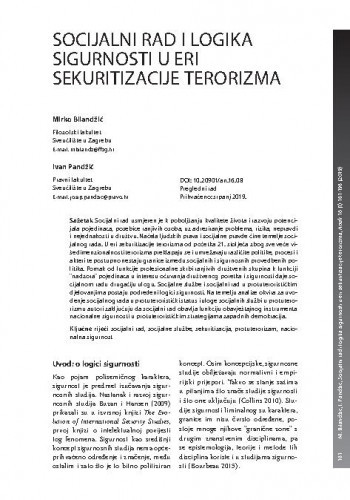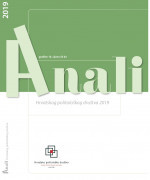Socijalni rad usmjeren je k poboljšanju kvalitete života i razvoju potenci- jala pojedinaca, posebice ranjivih osoba, uz adresiranje problema, rizika, nepravdi i nejednakosti u društvu. Načela ljudskih prava i socijalne pravde čine temelje socijalnog rada. U eri sekuritizacije terorizma od početka 21. stoljeća zbog sve veće višedimenzionalnosti terorizma preklapaju se i umrežavaju različite politike, procesi i akteri te postupno nestaju granice između socijalnih i sigurnosnih provedbenih politika. Pomak od funkcije profesionalne skrbi ranjivih društvenih skupina k funkciji "nadzora" pojedinaca u interesu očuvanja društvenog poretka i sigurnosti daje socijalnom radu drugačiju ulogu. Socijalne službe i socijalni rad u protuterorističkim djelovanjima postaju podređeni logici sigurnosti. Na temelju analize okvira za uvođenje socijalnog rada u protuteroristički status i uloge socijalnih službi u protuterorizmu autori zaključuju da socijalni rad obavlja funkciju obavještajnog instrumenta nacionalne sigurnosti u protuterorističkim strategijama zapadnih demokracija.; Social work is oriented towards improving the quality of life and devel- oping the potentials of individuals, especially of vulnerable social groups, as well as adressing societal problems, risks, injustices and inequalities. Human rights and social justice constitute the fundamental principles of social work. in the terrorism securitization era, i.e. from the beginning of 21st century, due to the growing multidimensionality of terrorism by which various policies, processes and actors overlap and network, boundaries between social and security policies have been gradually disappearing. Departure from the professional care for vulnerable populations function towards the "surveillance" function, by which individuals are controlled in the interest of preserving social order and security, puts social work in all its meanings in a different role. In counterterrorist action, social services and social work are becoming subordinated to the security logic. By analyzing the framework for introducing social work into counterterrorist status and the role of social services in counterterrorism it becomes clear that social work performs the function of a national security policy intelligence instrument in the counterterrorist strategies of Western democracies.
Sažetak

 Anali Hrvatskog politološkog društva : časopis Hrvatskog politološkog društva : 16,1(2019) / glavna i odgovorna urednica Mirjana Kasapović.
Anali Hrvatskog politološkog društva : časopis Hrvatskog politološkog društva : 16,1(2019) / glavna i odgovorna urednica Mirjana Kasapović.